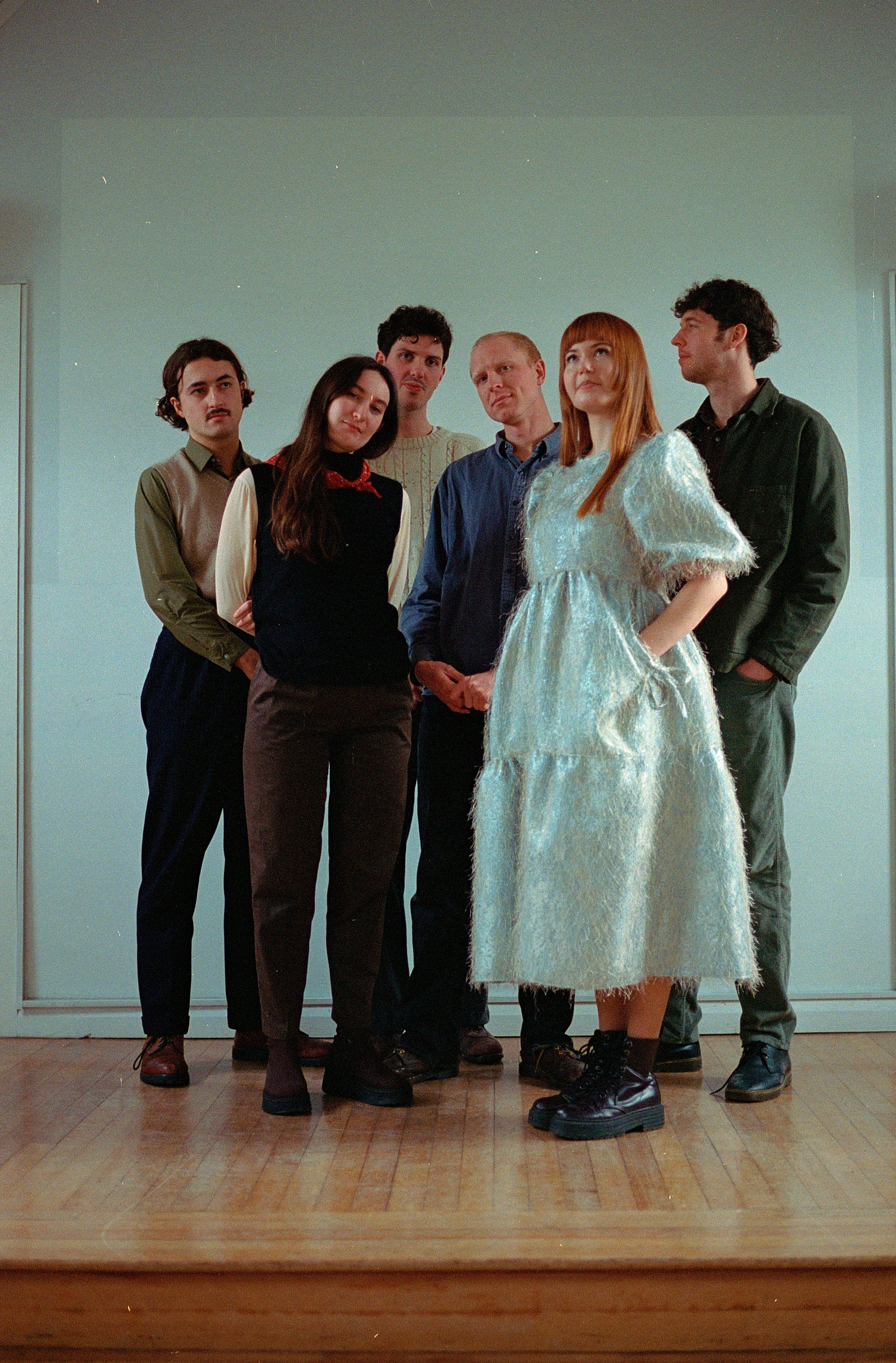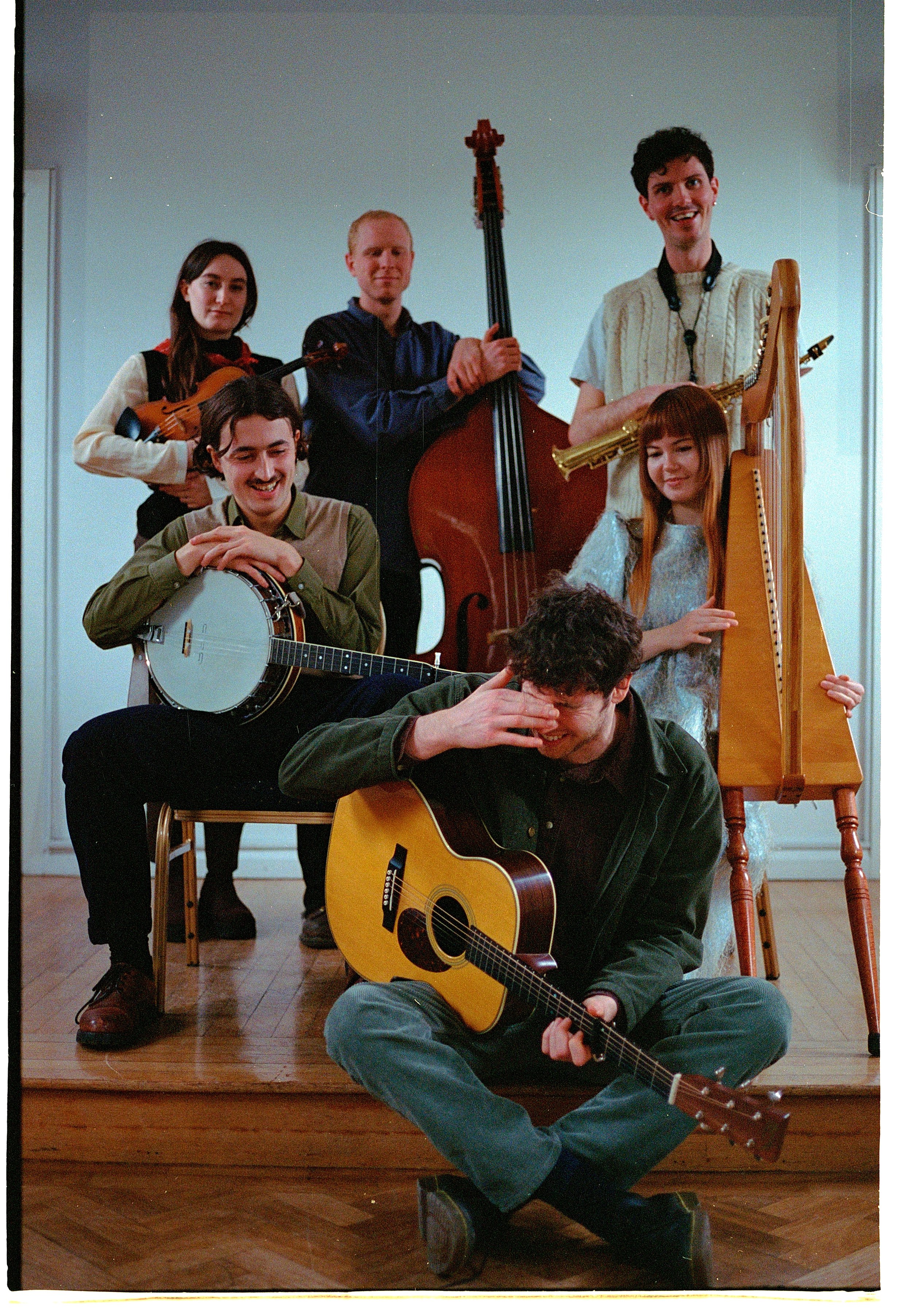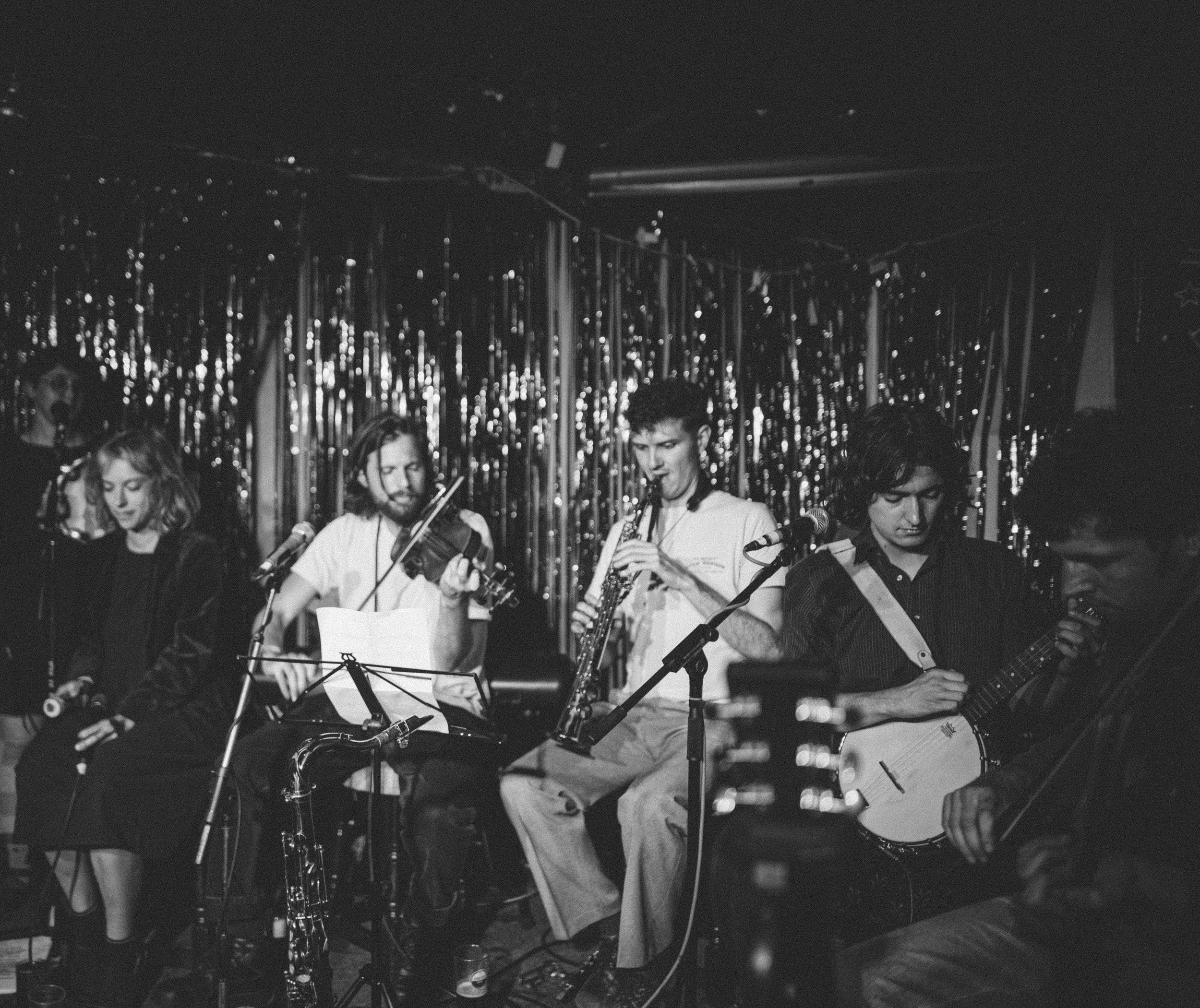In Conversation with : Broadside Hacks
What’s in a name??
Broadsides were one-sided and single-sheeted prints of popular songs. Between the sixteenth and early nineteenth centuries they were immensely popular in Britain, Ireland, and much of North America, becoming within these societies perhaps the most popular form of printed material available to the everyday consumer. Ubiquitous, inexpensive, richly diverse and decidedly engaged with the experiences of common folk, broadsides are a key piece of the puzzle when looking back at our lineage of popular musical expression.
There’s a cunningness, then, in wanting to ‘hack’ this heritage. To hew a way into the broadside ballad history with such unashamed, excited urgency of a wielded ‘hack’ could suggest a slipshod truncation - yet the ‘hack’ also means something else these days. It means a decrypting, a translation; an untangling of coded meaning.
It is in this vein of contemporary-ness that, you guessed, the Broadside Hacks operate within. They are a group making murmurations throughout the British scene (and beyond) for their committed and creative reimaginings of traditional ballads and songs, all the while acknowledging the evolutions that occur when engaging with these sometimes centuries-old stories.
The group is fluid and florid. Players weave in and out of the ‘band’, and the same songs are represented in new, different, ways with new, differing connotations.
In what ironically felt like a decidedly ancient form of communication, we zoom-called the Hacks’ Campbell Baum on a gorgeous day earlier in Spring to talk about folk music, the Broadside Hacks collective mission, and the profound relevance within traditional song for our times today. We tried to contain our excitement…
LB: Hi Campbell! Thanks so much for talking with us. We are huge fans of your music and the work you’re doing with Broadside Hacks. How did the project start? It was during lockdown right?
CB: Yeah, well the idea came pre-lockdown, but obviously when everything ‘fell apart’ so to speak it felt like a really great opportunity to turn this idea into something. I’d thought about it before, but lockdown definitely sped up the process as it encouraged us to take the time and space to really focus on it.
There’s something quite lovely as well in that even though the ‘idea’ had been brewing for a while - and you obviously have a deep vested interest in folk/traditional music - but that during lockdown when everything felt displaced this kind of traditional music and these ‘old’ songs could become a thread for a new community.
Definitely. Even though I hadn’t necessarily thought of it in those terms, when the campaign started for the ‘Songs Without Authors’ compilation it was one of those things that we realised was a really special and unique aspect of the project. I hadn’t really thought of it until the PR started, but in retrospect it’s a really cool narrative that’s there within the project.
What does ‘folk’ mean for you? What does that entangled word mean to you as an idea? How does it speak to you?
For me I think it’s always meant traditional music. A lot of the people I roped into the project write and perform their own music, so given that fact it was great to root the whole idea in traditional music as that felt like such a natural place to ground all these people together. It seemed like the right place to start, rather than just doing a ‘folk’ compilation that was maybe a mixture of traditional and original songs.
Yeah. Some of these songs are so ingrained into our collective social imaginary, unconsciously or otherwise, so it’s a fascinating playing field to fix the whole project upon especially with artists who perhaps aren’t usually within a ‘folk’ tradition.
In addition to the full-length 'Songs Without Authors', released September 2021, Broadside Hacks have released an acapella tape named 'Our Singing Tradition' from June of the same year. 'Our Singing Tradition' equally features an incredible breadth and diversity of performance from artists across the expanse of contemporary expression; ‘folk’ or ‘pop’ - or otherwise.There are some recognisable names that have been associated with the Broadside Hacks project, certainly some brilliant and original performing artists of the moment. Given that, it’s then so lovely to hear them engaging with traditional music through this compilation - it’s a really nice and exciting way to see an extra dimension to these artists.
For sure. There’s definitely a mixture on Songs Without Authors of people like Daragh Lynch [from LANKUM] and Junior Brother who, for instance, come from Ireland where trad music is such a huge part of their culture, they were raised on it, so it’s then nice to have folks participating who were really doing it for the first time.
I’m glad you mentioned Junior Brother… I was wondering when I was gonna be able to geek out with you about him.
Laughs
…He’s just one of my favourite artists of the moment. I saw him the other week actually in Glasgow…
Ah! Really?
He’s just so good!
He is, yeah he’s brilliant. He was one of those… seeing him in Dublin… me and my friend run an independent label together [the incredible Ra-Ra Rock Records] and we went out to see him play in Dublin. We’d heard Pull the Right Rope [Junior Brother’s outstanding debut album] online and loved it, so we went out in December 2019. And it was my first experience of seeing folk performed in a way that wasn’t, like, being sat down in a church listening to Fairport Convention celebrate their 50 years…
That’s a huge part of what I think makes the Broadside Hacks project exciting. Yes, there’s the traditional influences, the traditional songs, but it’s being performed in a way that feels like it is possessed by a distinctly contemporary mindset. That notion is even within the title, Songs Without Authors, there’s an acknowledgement that these songs don’t belong to anyone so they are, by extension, belonging to everyone. They belong to now.
Traditional songs resonate in their thematic timelessness. These are songs of trauma, and tragedy, but also of joy and silliness - and subversion.
This enduringly political dimension of folk music is a keen aspect of the group Shovel Dance Collective, another London-based group shining within the contemporary constellation of traditional music. Shovel Dance Collective fuse traditional song and source material to uncover ‘proto-feminist narratives and queer histories, and to make hear the voices of the working people who created and create the wealth of the world.’ A standout track on Songs Without Authors (in an LP of stand-out tracks) is their take on the tune ‘Georgie’, a harrowingly beautiful tale of stark desperation, imbued with a queerness that isn’t inflated or caricatured but fundamental to the very fabric of the performance. Shovel Dance Collective help us see an incredibly potent subversive lineage (queer and beyond) that has always existed not only in the continuum of folk expression, but of lived human experience. Such a motivated footing is essential in wrestling our folklore and history away from what has become colour-by-numbers tales of chivalrous sires and fretful maidens. Engaging with the social narratives that have existed throughout our history is such a simple yet so powerful an act, and by thinking back to the historical lives of labourers, migrants, and non-normative bodies we gain crucial contextualisation for our modern fights for self-expression and human rights. These narratives, these injustices - they aren’t new. They’re even written down in song.
Shovel Dance Collective star in the upcoming British Underground documentary ‘The Broadside Hack’, which alongside Broadside Hacks features the equally incredible Thrysis, caroline, and Boss Morris. The film premiered at SXSW 2022, and we asked Campbell about some of the approaches shared between this new generation of folk-minded musicians.
CB: I think what’s interesting is seeing how everyone approaches folk music, and all the different angles from which people have entered this world. It’s fascinating because with all the groups on ‘The Broadside Hack’ every project had come from a completely different place and had found folk from their own space and understanding. That’s always been interesting to me.
I guess, when some people are singing these songs they can be acting as a kind of mouthpiece for forgotten voices. The themes aren’t foreign to us, they’re themes that run through people now as they always have done. I definitely find when I’m flicking through these songs and books I’m trying to connect with themes that feel relevant to us and to me now.
Maybe that’s why these songs have connected with audiences that we’ve played in front of so far. We haven’t necessarily been playing to ‘folk audiences’, we’ve been playing to audiences who might have come to see us knowing us from other projects, like Katy J. Pearson, or Sorry, or Modern Woman, or caroline, but our approach to arranging these traditional songs is not all that different from how we would arrange our own songs. That filters through, perhaps making it easier to connect with people who aren’t as familiar with folk and traditional music. We’ve found ourselves being put on bills and festivals that we would usually be playing with our other projects - and it feels nice. That’s definitely one of the things that we wanted to do with Songs Without Authors, in presenting these songs in a way that was able to connect with younger and more different audiences.
It’s kind of coinciding with that slow germination out of lockdown. There’s just something irresistible when you have ten or so players on stage making this joyous, emotive, and deeply ‘traditional’ sound, especially given the power of the themes within the songs as we’ve talked about. It does feel quite hard not to be moved by it.
So it’s great to be seeing how the project is taking on a new dimension having primarily been set up as a record label over lockdown. That fact that you guys are now actually finally in the room together, making music together, shows the importance of connection and that connection being rooted within a specific place. Broadside Hacks is in many ways a celebration of the simple fact that this small corner of London has this incredible wealth and diversity of talent from such unique artists, and there’s a real joy in joining forces to explore this new boundary together.
Yeah definitely. I think going back to the whole idea of traditional songs and with who we are as a group, it’s not someone saying ‘oh, this is my song’, which is perhaps one of the reasons why it was able to be formed in the first place because people can just come and go. When one person isn’t there it doesn’t feel wrong to get another singer to sing it. That’s what helps the idea ticking over. I mean, I’m away next month, so there’s two gigs happening without me. We're doing a gig in Rotterdam without our usual double bassist for the first time… We’ve had a conversation about what we should do in these situations, but because everyone’s so busy it feels impossible to keep it as a fixed lineup.
You aren’t raising the drawbridge or anything… keep out!!
Well yeah! It was tough even thinking about how to approach press shots and stuff. We decided that if we recorded a track the promo would be those people who featured, and the next time it might be a completely different lineup ahah! But I think that’s fine. I mean, that’s Fairport Convention style.
Yeah, it’s like seeing a poster of Fairport Convention, or Steeleye, and it’s like ‘this is us! We’re playing this venue!’ but the picture’s from forty years ago and no-one’s in the band anymore!
One member left…
It’s nice to maybe think of Broadside Hacks as being within that lineage though. A little Fairport egg hatching for the 21st century.
Something like that!
You’ve also got a connection to Shirley Collins, too right?
Yeah so with The Broadside Hack (which we premiered at SXSW) that’s got a section with Shirley. She’s said a few words which is really nice. We’d actually seen a cut of the film already, without Shirley in it, and the producers British Underground didn’t tell us she’d be appearing in it. So we’re all stood there and she came on screen and we were like, ‘what!?’ She wasn’t talking about us specifically or anything, but it was a really special moment.
That’s the whole continuum of folk music in action though, isn’t it? It’s not ‘old music.’ It’s music that has existed for a long time in an infinitude of different societies and places and contexts, music with a constantly shifting relationship to the world around the people who are performing them.
I think it’s important that these songs don’t always feel as old as they are. They are still living and breathing things.
So what’s next? There’s obviously the film, which will hopefully have a UK release sometime soon, but is there anything else on the horizon? More collaboration? Another album?
Yeah it’d be nice to do another album at some point. We’re in the process of seeing if there’s any funding or anything for that. But really, we’re just working towards some festival slots this summer, and at each gig we’re adding more and more to the set. There’s going to be a tour that’ll be announced soon, hopefully we’ll be taking the documentary around the UK alongside a performance. But after the summer we’ll have a better idea of things, and some material that’s suited for an album or something.
Obviously, we’re so keen for more recorded stuff from you guys, but it’s also just lovely that right now you’re just enjoying being together and playing without having anything on a strict deadline or agenda.
For sure.
Well, obviously we can’t wait to see what happens - whatever that may be. Thanks so much for spending the time to chat with us, it’s been so lovely. Just one final question - it’s late at night, or maybe even early morning, and you’ve just managed to catch the Last Bus home after a really special night. What’re you listening to for your journey home?
Probably something along the lines of this. (Love Theme From ‘Spartacus’, by Bill Evans from ‘Conversations with Myself’ (1963))



